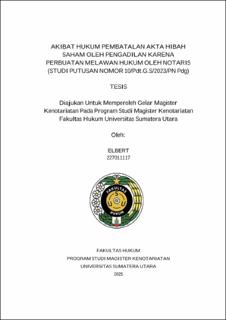| dc.description.abstract | Unlawful conduct by a notary refers to actions that violate the legal and ethical obligations inherent to the notarial profession. This includes the preparation of inaccurate documents, abuse of authority, or failure to adhere to professional ethics. This study aims to examine and analyze the validity requirements for share transfer through a grant and its legal implications for the implementation of the General Meeting of Shareholders (GMS), the legal consequences of unlawful conduct by a notary in drafting a share grant deed in relation to the GMS as stipulated in Court Decision No. 10/Pdt.G.S/2023/PN Pdg, and the legal liability of the notary following the cancellation of the share grant deed by the court.
This research employs a normative juridical method with a descriptive-analytical approach, utilizing both statutory and case-based approaches. Secondary data is the main source, consisting of primary, secondary, and tertiary legal materials, collected through literature review and analyzed qualitatively.
The findings indicate that the validity of share transfer through a grantrequires: a clear intention to grant, mutual consent between parties, proper written documentation, compliance with the company's articles of association, registration of the share transfer, and adherence to relevant legal provisions. The share transfer is considered legally valid for GMS purposes if it fulfills the requirements of Article 1320 of the Indonesian Civil Code. The unlawful act committed by the notary in drafting the share grant deed, as examined in Decision No. 10/Pdt. G.S/2023/PN Pdg, rendered the document legally defective and thus null and void by law. The notary's legal liability, pursuant to Article 1365 of the Civil Code, includes civil responsibility. It also entails
ensuring legal certainty and justice for shareholders through a legitimate Extraordinary GMS (EGMS) and obligating the defendants to comply with the court's decision. The judge declared that the EGMS resulting in Deed No. 15 dated April 13, 2009, was invalid due to procedural violations during the meeting's notice, contradicting Article 82 paragraphs (1) and (2) of Law No. 40 of 2007. | en_US |


